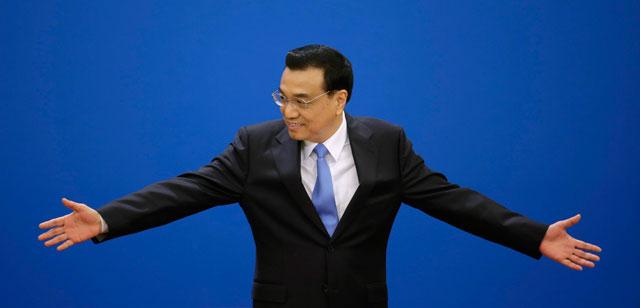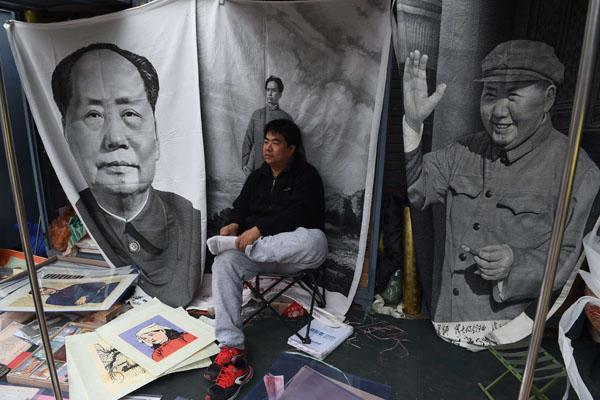You are here
China promises steady 7.5 per cent growth, cleaner air
By AFP - Mar 05,2014 - Last updated at Mar 05,2014

BEIJING — China is targeting growth of about 7.5 per cent in 2014, Premier Li Keqiang said Wednesday, promising to “declare war” on pollution as the government pledges to transform the world’s second-largest economy.
Li’s speech to the annual session of the National People’s Congress, which meets to approve policies decided by the ruling Communist party, highlighted the authorities’ plans to shift the economy to a more sustainable model.
“We must keep economic development as the central task and maintain a proper growth rate,” Li told the parliament, speaking before a backdrop of giant red flags in Beijing’s Great Hall of the People.
“On the basis of careful comparison and repeatedly weighing various factors, as well as considering what is needed and what is possible, we set a growth target of around 7.5 per cent.”
China’s three decades of rapid industrialisation have transformed its economy and seen incomes soar, but have also brought severe environmental consequences including smog that regularly blankets its cities.
Li said pollution was a “red-light warning” against inefficiency, as he sought to address public concerns on issues ranging from poisoned waterways to food safety.
“We will declare war against pollution and fight it with the same determination we battled poverty,” he said.
Authorities have repeatedly pledged action in recent months to improve the environment, but experts warn that implementation will be key.
In recent years air pollution indicators have been published more widely, but the country relies heavily on coal for energy and accounts for around half the world’s consumption.
The government will shut down 50,000 small coal-fired furnaces this year, clean up coal-burning power plants and remove six million high-emission vehicles from the roads, Li said.
Li also pledged cuts to “outdated production capacity” in industries such as steel and cement and reforms to pricing for household utilities.
“We will definitely enjoy more peace, happiness and prosperity as well as greater development,” he said.
But experts say implementation of such pledges is crucial, and Hong Kong-based Societe Generale economist Yao Wei described the tasks Li set out as a “mission impossible”.
“The new government promises to speed up reform, manage debt risks, fight pollution, and yet maintain 7.5 per cent economic growth all at the same time,” she wrote, adding of the proclaimed anti-pollution measures: “None of these are exactly pro-growth.”
Prosperity key to legitimacy
The government also unveiled a 12.2 per cent increase in defence spending to 808.23 billion yuan ($132 billion), another double-digit budget percentage rise for the world’s largest military.
The world’s second-largest economy grew 7.7 per cent in 2013, the same as in 2012 — which was the slowest rate of growth since 1999.
Rising prosperity is a key part of the Communist Party’s claim to legitimacy in China, and the government usually sets a conservative economic growth target that it regularly exceeds.
The figure is closely watched by analysts for insight into the leadership’s thinking about the economy and how they expect it to perform, as well as what policy initiatives they intend to pursue.
Keeping the target unchanged from last year suggests the government wants to stress stability as it carries out promised economic reforms, analysts said.
“On one hand it serves as a signal to stabilise expectations, while on the other it shows policymakers have confidence in maintaining stable momentum in the overall economy,” said Ma Xiaoping, Beijing-based economist for British bank HSBC.
Consumption new focus
China’s leadership says it wants to transform the growth model away from an over-reliance on often wasteful investment, and instead make private demand the driver for the country’s future development.
They expect the change to result in slower but more sustainable rates of expansion.
China’s once regular annual double-digit growth rates have been on a slowing trend, and the 2013 result meant GDP growth had been in single figures for three consecutive years for the first time since 2002.
The NPC comes after a major Communist Party meeting known as the Third Plenum in November that flagged economic reforms, including allowing the market to play a “decisive” role in the economy.
“Reform has brought us the greatest benefits,” Li said, adding there would be more changes to the financial sector, such as allowing financial institutions greater authority to set interest rates.
China began allowing banks to decide their own lending rates in July last year, but still sets deposit rates by administrative order.
He also called for keeping China’s yuan currency “basically stable at an appropriate, balanced level”, while expanding the band within which it is allowed to float against other units and moving towards capital account convertibility.
Financial authorities allow the yuan, also known as the renminbi, to move up or down 1 per cent daily on either side of a mid-point which they say is set by polling market-makers.
Related Articles
Premier Li Keqiang expressed determination Sunday to press ahead with reforms meant to reduce the Chinese government's role in the world's second-largest economy in hopes of spurring growth despite what he acknowledged would be pain for "vested interests" that benefit from regulation.
BEIJING — China has never said the economy must grow 7 per cent this year, Premier Li Keqiang said in comments reported by the government ah
BEIJING — China unveiled details on Sunday of how it would restructure its state-owned enterprises (SOEs), including partial privatisation,


















